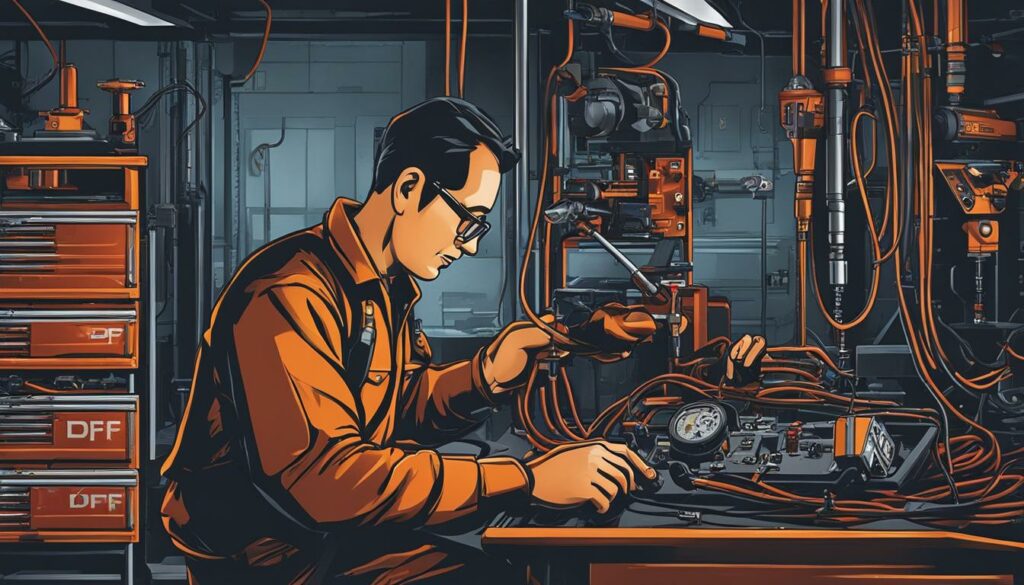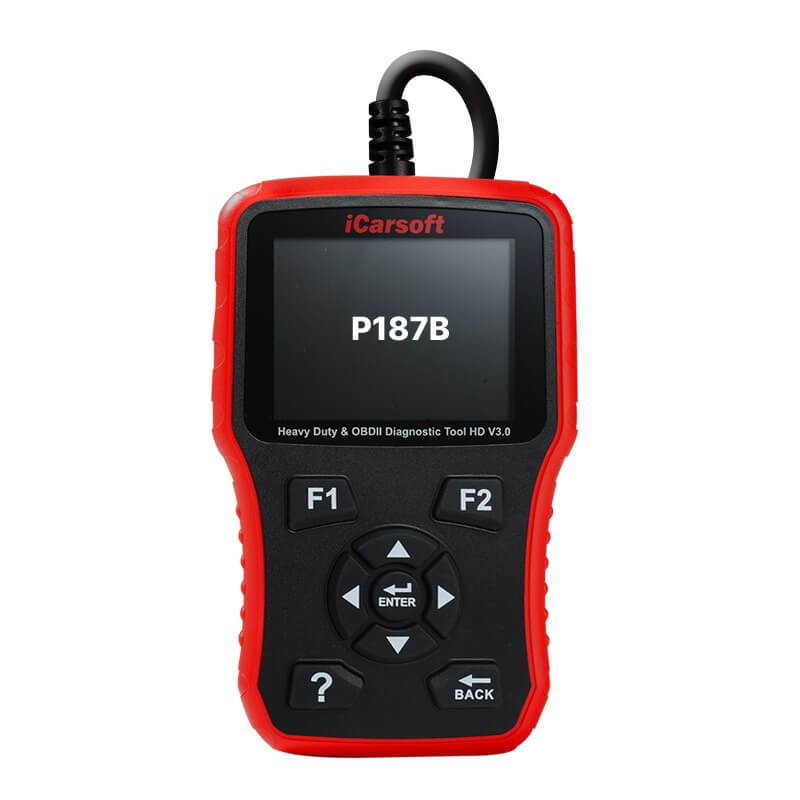P187B – DPF Outlet Temperature Sensor Circuit Performance
POSTED IN pcodes
Welcome to our article on P187B – DPF Outlet Temperature Sensor Circuit Performance. In this guide, we will explore the common causes, symptoms, and troubleshooting steps for this error code. The DPF outlet temperature sensor circuit plays a crucial role in monitoring the temperature of the diesel particulate filter in your vehicle’s exhaust system. When this circuit malfunctions, it can affect the performance of the DPF and lead to various issues.
Whether you are a car enthusiast or a vehicle owner facing this error, understanding its implications and how to address it is essential. By the end of this article, you will have a better grasp of the P187B code and be well-equipped to take appropriate steps towards resolving it.
Key Takeaways:
- The P187B code indicates a malfunction in the DPF outlet temperature sensor circuit.
- Common causes of this error include wiring issues, sensor failure, or problems with the DPF itself.
- Symptoms of this error can include dashboard warning lights, decreased engine performance, and increased exhaust emissions.
- Troubleshooting steps may involve inspecting wiring, testing sensor resistance, and checking for DPF clogs or damage.
- Consulting professional assistance or considering alternative solutions, such as uploading the ECU file, can help resolve the error.
Understanding P187B – DPF Outlet Temperature Sensor Circuit Performance
The P187B code is associated with the DPF Outlet Temperature Sensor Circuit Performance error. This error specifically affects the vehicle’s exhaust system, particularly the diesel particulate filter (DPF). When the P187B code is triggered, it indicates a problem with the DPF outlet temperature sensor circuit. The role of this sensor is to monitor the temperature of the DPF and ensure its proper functioning.
When the sensor circuit malfunctions, it can lead to issues with the DPF and compromise the overall performance of the exhaust system. To address this error, it is crucial to troubleshoot the DPF sensor circuit. This process may involve inspecting the wiring, testing the sensor’s resistance, and addressing any underlying issues with the DPF itself.
It is essential to promptly address the P187B error to prevent further damage to the exhaust system and ensure the vehicle’s optimal performance. Neglecting this issue can result in decreased engine efficiency, increased emissions, and potential vehicle malfunctions.
Buy tested tuning file for Adblue / EGR / DPF / Adblue off now!

Implementing proper troubleshooting techniques when dealing with the P187B code can help identify and resolve the root cause of the error. By ensuring the DPF outlet temperature sensor circuit is functioning correctly, vehicle owners can maintain the efficiency and longevity of their exhaust systems.
Next, we’ll explore the common symptoms and causes associated with the P187B – DPF Outlet Temperature Sensor Circuit Performance error.
Common Symptoms and Causes of P187B – DPF Outlet Temperature Sensor Circuit Performance
The P187B code, indicating a DPF Outlet Temperature Sensor Circuit Performance error, can present a variety of symptoms. It is important to be aware of these symptoms to identify and address the issue promptly. Some common symptoms associated with this error include:
- Warning lights illuminated on the dashboard: The error often triggers warning lights on the vehicle’s dashboard, indicating a problem with the DPF Outlet Temperature Sensor Circuit Performance.
- Decreased engine performance: The error may lead to a decrease in engine performance, affecting the overall efficiency and power of the vehicle.
- Increased exhaust emissions: A malfunctioning DPF Outlet Temperature Sensor Circuit can result in higher exhaust emissions, potentially causing environmental concerns.
- Potential limp mode operation: In some cases, the vehicle may enter limp mode, which reduces engine power to protect the vehicle from further damage.
Please note that the specific symptoms experienced can vary depending on the vehicle model and the severity of the error.
There are several common causes of the P187B error, including:
- Wiring issues: Problems with the wiring of the sensor circuit can cause the error to occur. This can include loose connections, damaged wires, or faulty wiring harnesses.
- Sensor failure: The DPF Outlet Temperature Sensor itself may be faulty or malfunctioning, leading to the error code.
- Faulty connections: Poor or unreliable connections between the sensor and other components in the circuit can contribute to the error.
- Issues with the DPF: The error can be triggered by underlying problems with the DPF, such as clogs, leaks, or other performance-related issues.
In order to resolve the P187B error, it is recommended to conduct a thorough inspection and diagnostic process. This will involve identifying the specific cause of the error and determining the appropriate steps for repair. Professional assistance may be necessary, especially when dealing with complex wiring issues or sensor replacement. Addressing the root cause of the problem is essential to ensure the optimal function of the DPF Outlet Temperature Sensor Circuit and the vehicle’s exhaust system as a whole.
Troubleshooting Steps for P187B – DPF Outlet Temperature Sensor Circuit Performance
When encountering the P187B code, troubleshooting the DPF Outlet Temperature Sensor Circuit Performance error typically involves several steps. By following these troubleshooting steps, you can identify and resolve the underlying issues causing the error. Here are the recommended troubleshooting steps:
1. Visual Inspection of Sensor Circuit Wiring
Begin by conducting a thorough visual inspection of the sensor circuit’s wiring. Look for any signs of damage, such as frayed wires, loose connections, or corrosion. These issues can interfere with the proper functioning of the temperature sensor circuit. If you find any wiring problems, repair or replace the damaged components to ensure a secure and reliable connection.
2. Testing the Temperature Sensor Resistance
Next, you need to test the resistance of the temperature sensor to determine if it is functioning correctly. To do this, you can use a multimeter to measure the sensor’s resistance. Refer to the vehicle’s service manual for the specific resistance values to compare your readings against. If the resistance values are outside the recommended range, it may indicate a faulty temperature sensor that requires replacement.
3. Inspection of the DPF
In addition to checking the sensor circuit, it is crucial to inspect the Diesel Particulate Filter (DPF) for any clogs, leaks, or other issues that may be impacting its performance. A blocked or damaged DPF can lead to inaccurate temperature readings and trigger the P187B error code. Inspect the DPF for any signs of blockage, leaks, or physical damage. If any problems are detected, address them accordingly, either by cleaning the DPF or replacing it if necessary.
4. Repair or Address Identified Problems
During the troubleshooting process, if any problems are identified with the sensor circuit wiring, temperature sensor, or DPF, it is important to repair or address them accordingly. This may involve replacing damaged wires, installing a new temperature sensor, or cleaning/replacing the DPF. By resolving these issues, you can rectify the P187B error code and ensure the proper functioning of the DPF outlet temperature sensor circuit.
Remember, if you are unsure about any of these troubleshooting steps or lack the necessary tools and expertise, it is recommended to seek professional assistance. A qualified mechanic or technician can diagnose and repair the P187B error code correctly, ensuring the optimal performance of your vehicle’s exhaust system.

Conclusion
In conclusion, the P187B code, indicating a DPF Outlet Temperature Sensor Circuit Performance error, is a critical issue that vehicle owners must address promptly to ensure the optimal function of their exhaust systems. Understanding the symptoms, common causes, and troubleshooting steps associated with this error empowers owners to take the necessary actions for resolution and the proper operation of their vehicles.
When faced with the P187B error, it is advisable to consult professional assistance for accurate diagnosis and repair. A qualified technician will be able to conduct a thorough inspection of the sensor circuit’s wiring, test the resistance of the temperature sensor, and identify any underlying issues with the DPF. Professional expertise ensures that the troubleshooting process is conducted effectively and guarantees the most appropriate repair solutions are implemented.
For those who may not have access to professional assistance, alternative solutions exist, such as the permanent removal of the P187B code by uploading the Engine Control Unit (ECU) file to a portal. However, it is essential to remember that this solution may not address the underlying issue and may impact the overall performance and emissions compliance of the vehicle. Therefore, regular vehicle maintenance, including prompt attention to any warning codes, is crucial to ensuring the long-term health and performance of the exhaust system.
FAQ
What is the P187B code?
The P187B code refers to a DPF Outlet Temperature Sensor Circuit Performance error. It indicates a malfunction in the DPF outlet temperature sensor circuit, which monitors the temperature of the diesel particulate filter (DPF).
What does the P187B code mean for my vehicle?
The P187B code indicates a problem with the DPF outlet temperature sensor circuit, which can affect the overall function of the vehicle’s exhaust system, specifically the DPF.
What are the symptoms of the P187B code?
Symptoms of the P187B code may include dashboard warning lights, decreased engine performance, increased exhaust emissions, and potential limp mode operation.
What are the common causes of the P187B code?
Common causes of the P187B code include sensor wiring issues, sensor failure, faulty connections, or problems with the DPF itself.
How do I troubleshoot the P187B code?
Troubleshooting the P187B code may involve visually inspecting the sensor circuit’s wiring, testing the resistance of the temperature sensor, and checking the DPF for any clogs or damage.


